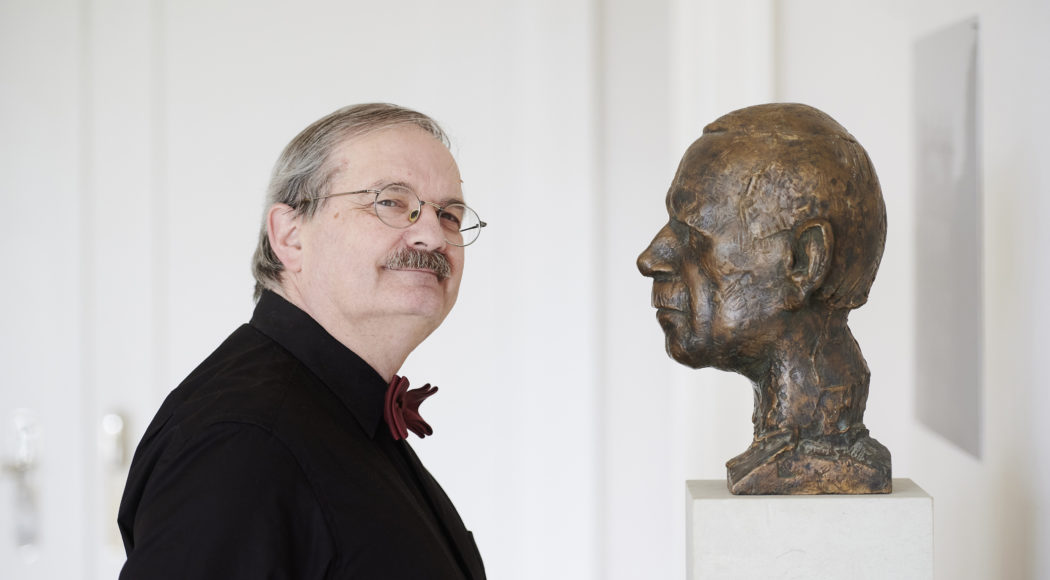Faces in HELLERAU – Friedemann Heinrich, Financial Management & Controlling, #1 – 2022
In our series “Faces” we introduce people who work in front of or behind the scenes to ensure that everything runs smoothly in the house and that our guests feel comfortable.
When and how did you come to HELLERAU?
At the end of my studies at the Fachhochschule der Sächsischen Verwaltung in Meißen, I did an internship at the Cultural Office of the City of Dresden in 1994. After half a week, an alarm call came from the Dresden Centre for Contemporary Music on Schevenstraße. The Dresden Contemporary Music Days were supposed to start in four days, but the scheduler in charge was no longer allowed to work overnight because of his Stasi past. So suddenly I was at the Dresden Centre for Contemporary Music with Udo Zimmermann and took over the organisation for the Dresden Contemporary Music Days. I was able to continue this activity even after graduation. In 2002, the year of the floods, we moved the centre to Hellerau.
What are your tasks today?
Together with my colleague Katrin Meinig, I am responsible for financial management and controlling. We take care of all income and expenditure, tax matters, accounting for the fire brigade, the residence flats, keeping evaluation lists, preparing grant settlements, settlements within the city administration, the annual financial statement and much more.
I used to be alone in the accounting department, but at some point I could no longer manage the work alone due to the increasing administrative demands and the more extensive play schedule. In Udo Zimmermann’s time until 2006, we ran the Dresden Contemporary Music Days as a festival over ten days in October and only occasionally organised other events. With Dieter Jaenicke, a continuous performance schedule began, just as it is in other theatres. Fortunately, a new position was then created. And if it weren’t for my colleague Katrin Meinig here today, this would be sheer chaos.
What was a particular challenge that you overcame?
From an accounting point of view, it was working with the lowered VAT in the second half of 2020, because the decisive factor in each case was the performance period and not the date of invoicing. By the time the last person had understood this, half the year was already over. In this half year, we have used 33 different tax codes – I think this is the absolute record in the city. This difference in taxation has to do with the fact that HELLERAU is run as a commercial enterprise within the city of Dresden and is therefore partly entitled to deduct input tax. This in turn depends on the tax status of the artists and the income, which leads to the fact that … but that would take us too far here now. Since the tax audit by the tax office usually takes place five to seven years later, you should still know what you did at the time and why you did it.
What do you particularly like about HELLERAU?
The fascinating thing about HELLERAU is the multifunctionality of the space. In classical theatre, the audience takes up most of the space and the stage is a peephole. With us, you can work with several seating arrangements, and any spotlight can be hung from any corner of the ceiling. And it is precisely these events, where we deviate from traditional seating, where the space is given a special design, that are always very special.
I have particularly fond memories of the “Heimat” project (2007), where Peter and Harriet Meining commissioned eight different groups to do something with an ordinary garden shed from the DIY store. The entire space was covered with turf and the audience strolled through the space and could watch the performance of the little houses. The 360° music theatre “Lebende Minus Tote” by theatrale subversion last year was also something special like that.
In my time here, I have experienced three different directorships, each with three very different signatures. These three signatures are an expression of the many possibilities of the house.
What do you wish HELLERAU for the future?
I hope that we can do the big hits again. That we can welcome an international ensemble that travels from Tel Aviv to Madrid, Paris, HELLERAU, Warsaw and Moscow.
You are also connected to the stage in your private life. What exactly do you do there?
In my spare time I manage the cabaret “Die Kaktusblüte” (The Cactus Blossom) and have enjoyed performing on the stage for over 40 years.


